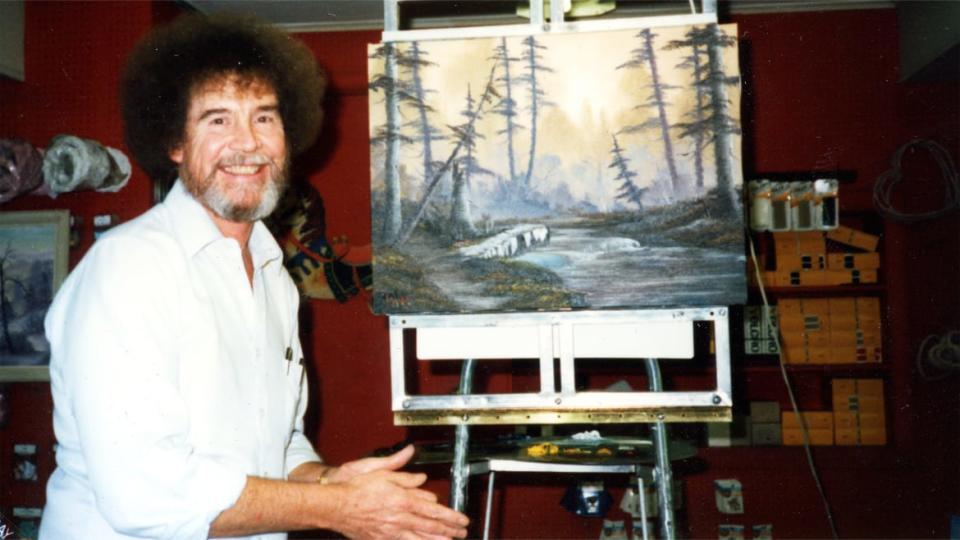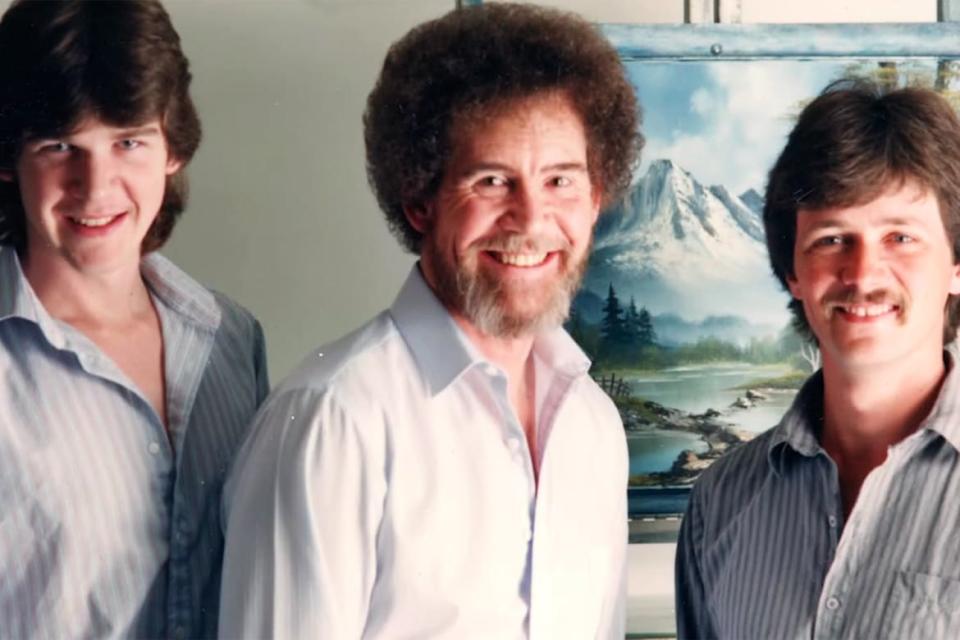Netflix Exposes the Dark Side of Bob Ross’ ‘Joy of Painting’ Empire

Bob Ross: Happy Accidents, Betrayal & Greed sounds like the title of a true-crime parody, promising a dark and gritty take on the life of one of America’s cheeriest—and most beloved—artistic figures. Nonetheless, there’s nothing jokey about Joshua Rofé’s Netflix documentary (Aug. 25), which serves as both a loving portrait of the landscape painter who inspired millions to pick up a brush, and a disheartening exposé of the various ways in which his work, and legacy, were exploited by the selfish partners closest to him.
Rofé’s film is, first and foremost, a celebration of a caring, ambitious man who rose from humble origins to become a unique (that afro!), ubiquitous presence on American public television. As recounted by his son Steve, his good friend Dana Jester, his small-screen director Sally Schenck, and his first instructor John Thamm, Ross didn’t always seem destined for stardom. Having joined the Air Force at the age of 18, Ross developed his love of painting gradually. The moment that initially changed the course of his life came when he saw Bill Alexander’s The Magic of Oil Painting on TV. Awestruck by Alexander’s skill at completing paintings over the course of a single episode via a swift wet-on-wet technique (also known as “alla prima”), Ross began training, as well as crafting his own paintings on gold miners’ pans. Before long, he had tracked down Alexander, who made him his de facto apprentice.
Sex, Deceit, and Scandal: The Ugly War Over Bob Ross’ Ghost
Ross subsequently taught classes at some of the numerous workshops that Alexander held around the country (his television show was largely a way to steer students to his money-making program). It was there that Ross met Annette and Walt Kowalski, a couple who were smitten with the young artist. They advised Ross to strike out on his own, and in the process, they became the nuts-and-bolts businesspeople behind the Bob Ross phenomenon that would take off once they struck a deal for the PBS series (The Joy of Painting), which would run from 1983 to 1994. For a time, this arrangement worked perfectly, and everyone benefited. Yet according to the documentary, trouble was brewing, starting with Ross’ alleged affair with Annette behind the back of his second wife Jane—which Annette denies to this day—and then with the Kowalskis’ increasing demands that Ross prioritize profit ahead of everything else.

(L TO R) Steve Ross, Bob Ross and Dana Jester in Netflix’s Bob Ross: Happy Accidents, Betrayal & Greed
While his gift for landscapes was awe-inspiring, Ross truly became a sensation thanks to his Fred Rogers-style personality. Via copious clips from The Joy of Painting, Rofé captures his subject’s gentle, upbeat spirit. In a soothing voice that often flirted with sensuality—as if his comments to “caress” the canvas were intended to be taken in a more adult way—Ross peppered his episodes with encouraging words about everyone’s capacity for artistic creation and expression, including those who might think themselves unfit for the undertaking; in perhaps the most touching archival snippet, Ross paints a snowy white-and-gray landscape to prove to a fan that even the color-blind can paint. His message was one of courage, self-confidence, self-reliance, and resilience—the last of which was at the heart of his belief that there were no such things as mistakes, only “happy accidents” from which one could always learn something valuable.
To the same degree that Bob Ross: Happy Accidents, Betrayal & Greed venerates Ross it censures the Kowalskis, here depicted as a secretive couple whose habit of suing people remains so ingrained that more than a dozen people who knew and worked with Ross declined to participate in Rofé’s film. Since Walt and Annette also refuse to appear on-camera, no counterarguments are made on their behalf, and the story that Steve and Dana have to tell about the duo’s conduct following Ross’s demise from cancer in 1995 is decidedly unflattering. According to them, and first reported by The Daily Beast, the Kowalskis spent the better part of Ross’ final year trying to get him to sign over the rights to his name and likeness, and once he passed away, they—through their Bob Ross, Inc.—sued to get what they wanted, badgering Ross’ half-brother Jim and third wife Lynda to give in to their requests, as well as putting fellow hobby craft-industry bigwigs Gary and Kathwren Jenkins (whose specialty was floral painting) out of business.
For the past 26 years, the film alleges, Steve hasn’t seen a dime of the millions made off of his father, even though Ross had supposedly intended for his son and half-brother to be the joint beneficiaries of his IP rights. Bob Ross: Happy Accidents, Betrayal & Greed is thus a tale of a warm-hearted soul who seems to have been taken advantage of, in life and death, by those who valued him solely as a vehicle for making money. Steve and Dana’s disgusted and occasionally teary commentary about this turn of events is persuasive enough to elicit a good bit of outrage about this sorry state of affairs. Steve attempted to combat this injustice by suing the Kowalskis (via a new company he’d set up called RSR Art), but when that failed, he was left with little additional recourse, and in Rofé’s documentary, Steve—with long thinning hair, a gray goatee, and a weathered countenance—looks beaten down by tragic loss and predatory wrongs.
How the World’s Priciest Painting Ended Up in the Hands of a Notorious Killer
As with his previous Sasquatch and Lorena, Rofé smoothly interweaves old video and audio material, present-day interviews shot in a variety of locales, and striking recreation sequences—in this case, stationary Ross-esque paintings of incidents related by his speakers—to capture the various angles of his saga. Despite its somewhat misleading title, which is technically accurate but suggests more sensationalism that the film delivers, Bob Ross: Happy Accidents, Betrayal & Greed does convey the ruthlessness of capitalistic enterprise, especially when there are untold riches to be earned from a star and the myriad ancillary T-shirts, pajamas, lunch boxes and Chia Pets (ugh) that their name and face can sell. If anything, Ross is as popular today as he ever was—if not more so, as evidenced by a late montage of contemporary pop-culture shout-outs to the artist (including from Deadpool)—which is what ultimately renders Rofé’s expose of manipulation and avarice so depressing.
Get our top stories in your inbox every day. Sign up now!
Daily Beast Membership: Beast Inside goes deeper on the stories that matter to you. Learn more.

 money
money 